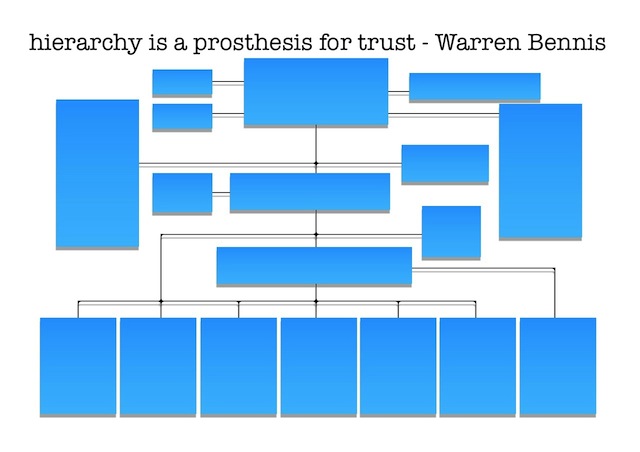
From changeagentsworldwide.com
Interesting things happen when hyperlinks subvert hierarchy, as the writers of the Cluetrain Manifesto said in 1999. Wikileaks, Edward Snowden, Arab Spring, and the Occupy Movement are just a few recent examples. Spying on entire populations is another network era phenomenon. In education, the current subversion is the MOOC, which has already itself been subverted by corporate interests. In the labour movement we are seeing things like alt-labour as well as a growing shareable economy. Networked, distributed businesses, like AirBNB, are disrupting existing models, with the inevitable push-back as they become successful.
Networks will transform education, business, the economy, and society even further. In the network era, the creative economy will gain dominance over the information and industrial economies. Professional knowledge distribution will move away from institutionalized business schools into networked communities of practice.
The key to a flourishing society in the network era will be distributed sense-making. Self-instruction, the basis of personal knowledge management, will be a requirement in a growing number of peer-to-peer networks. Networked learning will give rise to networked decision-making.
In the network era we have to understand how to become contributing members of networks, for work and for life. This should be a major focus for all professional training and education. Without good sense-making skills, the citizenry cannot understand complex issues that affect us all, such as individual privacy versus national security. These issues require networked, human intelligence, not broadcast sound bites, nor ‘learning objects’.
Fellow Change Agent, Jon Husband says that we are all in this together.
The interconnected Information Age is beginning to show us that we’re all linked together – and that the whole system matters.
This principle applies to organizations, to networks of customers, suppliers, employees and communities, to our societies and to the planet.
New language for this principle is popping up everywhere – knowledge networks, intranets, communities of practice, systems thinking, swarming, social software, social networks, tipping points.
Awareness is the key. Maintain an "open focus".
Being aware of yourself, others and the effects of your actions and ways of being in relation to others is a fundamental requirement in these conditions.
To thrive in the network era we need to understand networks – social networks, value networks, information networks, etc. The network era has already changed politics, created new dominant business models, opened up learning, and is now changing how organizations operate – on the inside. Once we are able to talk about networks, we will see that many of our current work practices are rather obsolete. From how we determine the value of work, to how we calculate pay for work; organizations will need to adapt to the network era.
Another possibility is that hierarchical organizations, like most companies, will not be able to adapt to the network era. As with the assembly line, the view of the company as an organization chart may become a relic of the past.
In the very near future it is quite possible that most of us will be working in knowledge networks, whether we are farmers or software engineers. A knowledge network in balance is founded on openness which enables transparency. This in turn fosters a diversity of ideas, and can promote innovation. The emergent property of all these exchanges is trust.
The network era may revert the role of the organization to merely a supporting one. We might even see corporations bidding for the privilege of supporting knowledge networks. This approach to work is practiced here at Change Agents Worldwide, which is firmly based on transparency and trust amongst its members.
As more people work in distributed networks they may realize how little they have to gain from traditional organizations. Networks that foster autonomy as well as interdependence are a much better vehicle for rewarding work than hierarchical organizations can ever be. Hierarchies, driven by external and formal direction, cannot compete with connected workers working in trusted networks, for they are intrinsically motivated.
In networks, cooperation trumps collaboration. Collaboration happens around some kind of plan or structure, while cooperation presumes the freedom of individuals to join and participate. Cooperation is a driver of creativity. Cooperation is also driven by intrinsic motivation.
No person, no matter where in an organizational hierarchy, has all the knowledge needed to thrive in the network era. Neither does any company. Neither does any government. We are all connected and dependent on each other. Hierarchies divide us.
Managing professional relationships as a network allows each node (person) to be unique. This removes the artificial barrier of the job, which assumes that people are replaceable, and that knowledge flows up and down. Knowledge in a network is about connecting experiences, relationships, and situations. This is what work looks like in the network era.